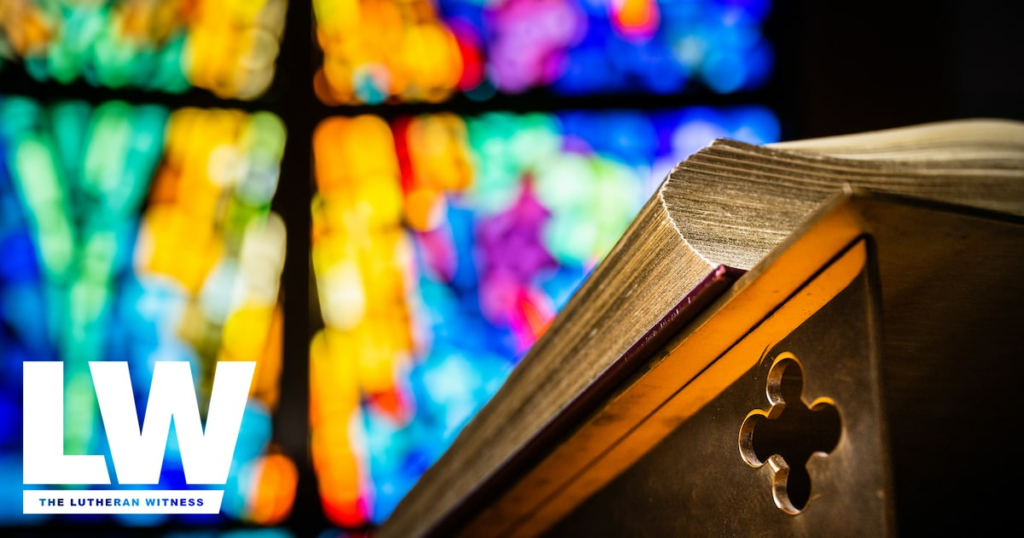by Prof. John T. Pless
One should avoid going to a restaurant where the chef cannot tell the difference between cyanide and salt. A pinch of salt flavors the food, but a dash of cyanide would be lethal. Distinctions matter. Where they are improperly made, the results can be deadly.
Pastor C. F. W. Walther (181187) knew that where God’s Law is not rightly distinguished from His Gospel, the spiritual lives of people are endangered, driven either to futility and despair or to Christ-denying self-confidence and arrogance. The end result is the same: unbelief that condemns. Where the Law and the Gospel are mixed together, faith is endangered, and uncertainty rules the day.
Among the many gifts that we received from the Lord through C. F. W. Walther is the biblical truth that God speaks to human beings in two fundamentally different, even opposing, ways. The Scriptures identify this twofold manner of speaking as Law and Gospel. The great 20th-century theologian Werner Elert observed that Walther was one of only two men who genuinely grasped what was at stake with this teaching in the 19th century.
Walther, a careful student of Luther and the Lutheran Confessions, followed the pattern of the Apology of the Augsburg Confession: “All Scripture ought to be distributed into these two principal topics: the Law and the promises. For in some places Scripture presents the Law, and in others the promises about Christ.”
In a series of Friday evening lectures for seminary students, now published under the title Law and Gospel: How to Read and Apply the Bible, Walther echoes the teaching of the Lutheran Confessions when he writes, “The doctrinal content of all Holy Scripture, both of the Old and the New Testament, consist of two doctrines that differ fundamentally from each other. These two doctrines are Law and Gospel.”
Like Luther before him, Walther knew that the ability to rightly distinguish the Law and the Gospel was a hard and difficult art to learn, one that finally could only be taught by the Holy Spirit through God’s Word as the believer lived under the cross of spiritual affliction. Far more than a technique or method acquired by academic study, the ability to know and apply both Law and Gospel comes only through the experience of hearing and trusting God’s Word even as one lives in constant battle with sin and the devil.
Walther knew of this battle. He had experienced it in his youth as a university student in Germany exposed to the teachings of both Rationalism and Pietism. These two powerful movements blurred the distinction of the Law from the Gospel, leaving people in uncertainty over their standing before God.
Rationalism would reduce God’s Law to moral precepts capable of being fulfilled with the aid of natural, human wisdom, leaving no room for a Savior who would fulfill the Law in His obedient life and His sacrificial death. Subjecting Holy Scriptures to the judgment of human reason, it rejected the Gospel as obsolete. If God’s Word could not be trusted, then the sinner was left with his own strivings to lead a morally decent life. Ethics became more important than doctrine.
Pietism focused on the subjective experience of the believer, directing him to the testimony of his own emotions. Again, this deprived struggling Christians with the certainty of salvation through Christ alone. As a young man, Walther had been tyrannized by the uncertainty created in his heart by the demands of Pietism. It was only as he heard the true Gospel of Jesus Christ preached as God’s sure and certain promise to be the Lord of real sinners that Walther found peace for his tormented soul.
In his Law and Gospel, Walther demonstrates how God’s Law is different from His Gospel in the way that they are revealed, in their content, in the way they either threaten or make promises, in their effects and in regard to the persons to whom they are to be preached. Walther wants Christians to know that the Law of God is not the way of salvation but it is that Word of God that reveals divine wrath over sin and threatens unrepentant sinners with condemnation.
While the Law of God promises life to those who keep it and threatens punishment to all who break it, it is powerless to make a person righteous in the sight of God. It is only the Gospel that declares sinners to be righteous, not on account of their morality or good intentions but solely because of the work of Jesus Christ who has fulfilled the Law, suffered under its condemnation in our place and was raised from the dead as our Brother.
Walther was insistent on rightly discerning the difference between the Law and the Gospel so that broken sinners might come to know and to trust God’s ultimate Word of Good News, the promise that Jesus’ blood and righteousness alone give us the forgiveness of sins. That’s the Gospel that makes and keeps us Christian, and it is to predominate in all preaching and teaching.
—
> Go to www.cph.org to order Law and Gospel: How to Read and Apply the Bible.
About the Author: Prof. John T. Pless is assistant professor of Pastoral Ministry and Missions at Concordia Theological Seminary.
October 2011







Pingback: A constellation of denials – Lutheran Orthodoxy